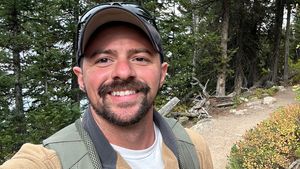All eyes should be on the U.S. Supreme Court on Tuesday as it hears three potentially game-changing cases about LGBTQ+ employment discrimination. The outcome will determine to what extent federal law protects queer and transgender people under the Civil Rights Act of 1964 and whether we can be fired just for being who we are. The stakes for our communities could not be higher.
Without question these are the most important cases for the LGBTQ+ community since the 2015 ruling in Obergefell v. Hodges, which won same-sex couples the freedom to marry. At the center of the three cases set to be heard before the court on October 8 are Aimee Stephens, who was fired because she is transgender, and Gerald Bostock and Don Zarda, who were fired because they are gay. With these cases, the court will have the opportunity to affirm -- or deny -- that LGBTQ+ people have the right to do our jobs to support ourselves and our families without the fear of facing discrimination and harassment at work.
The law is squarely on our side, with a number of federal agencies and lower federal courts ruling that discrimination against LGBTQ people is sex discrimination under Title VII of the Civil Rights Act. Federal agencies like the Equal Employment Opportunity Commission (EEOC) have been investigating incidents of discrimination against transgender people since 2012, providing an important remedy against chronic employment discrimination for a particularly vulnerable part of our LGBTQ+ community.
Trending stories
Yet this is a nerve-wracking time to be transgender in the United States. Our community is under increasing attack from both state and federal governments; we've seen a number of hard-fought protections reversed with little regard for the real lives impacted, and an epidemic of violence continues to claim the lives of trans women of color.
Meanwhile, employment discrimination is a chronic issue that impacts most transgender people at some point in our lives. In its 2015 National Transgender Discrimination Survey, the National Center for Transgender Equality found that "30 percent of respondents who had a job reported being fired, denied a promotion, or experiencing some other form of mistreatment in the workplace due to their gender identity or expression." That was just in the 12 months prior to the survey.
As a gay, transgender man who has been out for more than 20 years, I'm anxious about what the outcome in Stephens' case will mean for trans people's ability to live, work, and move around the country safely. I have known accomplished professionals who were at the top of their careers end up jobless merely because they came out as transgender. I've known brilliant LGBTQ+ youth end up on the streets instead of at school or work after being rejected by their families and schools alike. And I have personally known what it feels like to experience soul-crushing anti-gay and anti-transgender-based harassment at more than one job.
I also remember the days before agencies like the EEOC and courts across the country began to hold companies accountable for discrimination against LGBTQ+ people. Given the many barriers trans people face in just about every institution in the United States, we need and deserve full protection under the law and cannot afford to go back to the days sans protections.
That's why -- for transgender people, in particular -- Aimee Stephens' case is the most important that SCOTUS has ever considered about our ability to work and be ourselves. For me, and for many trans folks, the implications are even more profound than the Obergefell decision. A ruling in the Stephens case will determine if it's perfectly legal to fire someone, refuse to hire someone, or pass someone up from a promotion merely because we are transgender. For a population that's already economically marginalized, these are high stakes, indeed.
I find it helpful to remember that the anti-trans attacks we are witnessing come at a time when we've also seen tremendous progress. Last year, in the first-ever popular vote on whether or not to uphold legal protections for transgender people, the people of Massachusetts voted in our favor by a historic two-thirds margin. Across the country, parents of transgender youth are speaking out and advocating on their behalf. And we know that 70 percent of Americans support nondiscrimination protections for LGBTQ+ people nationwide.
These strides are happening amid historic setbacks because people from all walks of life -- and in all parts of this country -- value fairness and treating people with dignity and respect. Ironically, I suspect the public anti-trans animus of the current federal administration is unwittingly bringing new allies to our side.
That kind of support wasn't always the case. It certainly wasn't the case when I was growing up in parsonages throughout Missouri. My parents had no context in which to understand what I needed as a gender nonconforming child in the 1970s, and I didn't even know the word "transgender" until I was in my 20s. Even when I began my own gender transition as an adult, I had family and friends who thought I must be daft; thankfully, most have come around and are now some of my biggest champions.
The fact that we're seeing overwhelming mainstream support around the country for LGBTQ+ people -- and most especially transgender people -- is a testament to the hard work of activists over many decades and the bravery of those who had the courage to come out and live their lives openly. We have fought hard to be recognized and to have won a modicum of rights in this country. We cannot stop now.
A Supreme Court ruling in our favor would send an important message that transgender people should be treated with dignity and fairness. A ruling otherwise would come as a shock, both to our community and the broader American public, and would have a profound impact on the movement for LGBTQ+ freedom. Will transgender people in Missouri or Mississippi be able to get their day in court if they are fired during their gender transition? One way or the other, we will know for certain in the coming months to what extent trans people can rely on the federal government and the courts to recognize and protect us.
But there's something critical to keep in mind: No matter how the court ultimately rules, Congress will need to finish the job by passing comprehensive federal protections such as those offered in the Equality Act. A strong, positive ruling from SCOTUS should lay the legal framework needed to affirm nationwide LGBTQ+ protections at work, at school, in housing, and in healthcare; however, federal law still doesn't ban sex discrimination -- which includes discrimination based on sexual orientation and gender identity -- in critical areas, such as public places like restaurants, stores, and hotels. The court should rule in our favor and we need the Equality Act so that LGBTQ+ people across the country are protected in all areas of our lives.
Being treated fairly shouldn't depend on what zip code we're in or which political party controls our legislature. I left Missouri decades ago in search of safety and a supportive community. I now live in Washington, D.C. and before that lived in California for many years, so I've been fortunate to know that I'm protected at home. That's true for many of us who live on the coasts, but no one should have to leave our birthplaces and families of origin to have basic protections, and I'd like to know that I could move anywhere in the U.S. and be treated fairly.
Today, there are 30 U.S. states that don't have full express and enduring statewide protections. That means that transgender people living in those states are vulnerable. It also means when I travel to my home state of Missouri, or when I travel to visit friends, or go on one of my many work trips, I'm also at risk. The current patchwork of protections across the country is unfair and unworkable. It's unsustainable and leaves too many people behind. All of us should be able to live, work, and access basic services free from discrimination and harassment, no matter which state we call home.
Our LGBTQ+ community has been working on nationwide nondiscrimination protections for 50 years. Like many of us, I marched and lobbied in favor of the Employment Non-Discrimination Act (ENDA), an early forerunner to the Equality Act, years back in my earlier days as an activist. We've made so much progress since then. These court cases and our work ahead in Congress on the Equality Act bring us closer to true fairness. This is the direction our country needs to go in. It's time for more love and fairness, and less fear and discrimination.
The cases before SCOTUS are about moving our country forward toward a future where all LGBTQ+ people can be who we are: where we can love who we love; where we can live in any state and know we're protected; and where we can live with safety, dignity, and respect. It's time.
Masen Davis is a long-time LGBTQ equality activist. He is the outgoing CEO of Freedom for All Americans and the previous Executive Director of the Transgender Law Center.
RELATED | I Was Fired Because I'm Gay. I'm Fighting Because It Is Wrong

























































































The October 8 Supreme Court Case Is the Trans Community’s Moment
Being treated fairly shouldn’t depend on what zip code we’re in or which political party controls our legislature.
Masen Davis